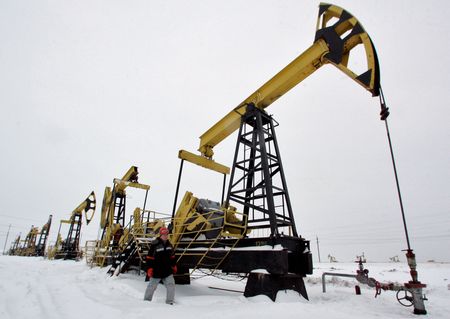 1
1 1
1

(Reuters) – Russia’s oil and gas condensate output rose in February to 11.06 million barrels per day (bpd), according to Reuters calculations based on an Interfax report on Wednesday, while trading has been stalled due to sanctions over Ukraine.
The production rose from 11 million bpd in January, while in tonnes, Russia’s total oil and gas condensate production was 42.23 million last month, Interfax news agency said, compared with 46.53 million in January, which was three days longer.
Russia has struggled to sell its oil following West’s sweeping sanctions over last week’s Russian invasion of Ukraine. Moscow calls its actions in the neighbouring country a “special operation”.
The knock-on effects of sanctions were felt all across the oil market. Russia’s key Urals oil grade was bid at a discount of more than $18 below physical Brent crude, the primary worldwide benchmark, a record in the post-Soviet era. Even at that price, traders have been unable to find willing buyers.
Interfax also said Russian oil exports outside ex-Soviet Union rose by 12.7% year-on-year in January-February to 36.99 million tonnes, or 4.6 million bpd on average.
Russia has been restoring its oil output in tandem with the Organization of the Petroleum Exporting Countries (OPEC) and its allies, a group known as OPEC+, amid a recovery in demand, which had been dented by the pandemic.
OPEC+ group of leading oil producers will meet later on Wednesday to decide on its production policy. The group is widely expected to keep its output rising by 400,000 bpd each month despite conflict in Ukraine.
In April 2020, Russia agreed to reduce its oil production by more than 2 million bpd, an unprecedented voluntary cut, along with other leading oil producers and the OPEC. Its oil and gas condensate production stood then at over 11.3 million bpd.
Russian Deputy Prime Minister Alexander Novak, in charge of Moscow’s ties with OPEC+, had said the country would recover its oil production by May 2022, a view challenged by some analysts, who said it would be difficult to restore oil wells, shut as part of efforts to curb output.
(Reporting by Reuters; Editing by Jacqueline Wong and Uttaresh.V)